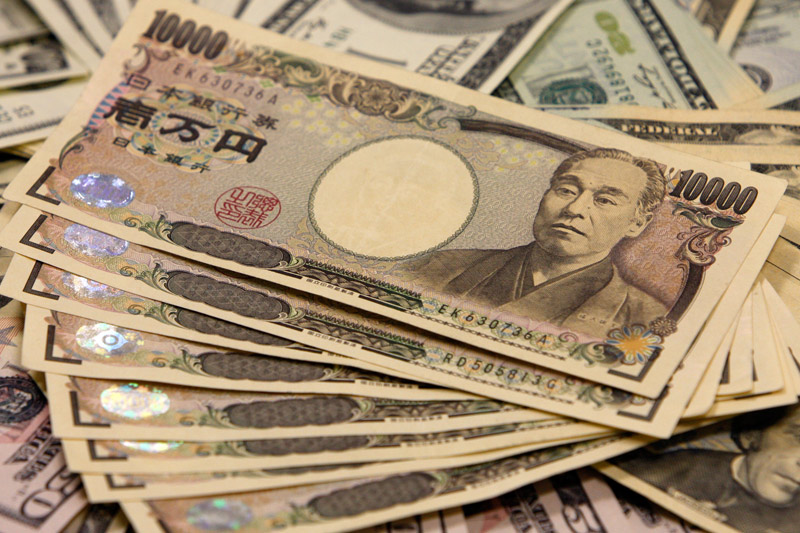Japan Inc. goes naked as yen’s slide wipes out currency hedges

By Bloomberg
The yen’s precipitous drop to a 13-year low has made Japan Inc. forgo hedging currency risk.
The currency’s plunge below 125 against the dollar this month wiped out many existing hedges and also made replacing those contracts prohibitively expensive for Japanese companies buying the U.S. currency to pay for their imported goods, according to FPG Securities Co. and Mizuho Bank Ltd.
Bank of Japan Governor Haruhiko Kuroda remarks June 10 that it was difficult to see the yen weakening further against major partners capped more than a week of comments from officials questioning whether the depreciation is becoming harmful for the economy. Corporate Japan now faces the risk of importers playing catch up by boosting their dollar buying, setting the stage for further declines as the yen drops toward its first-ever four- year slide.
“Many companies have not been able to hedge their currency positions and with the recent slump in the yen, this is going to weigh on them due to rising costs,” said Koji Fukaya, the chief executive officer at FPG in Tokyo, which provides over-the- counter currency derivative products for companies. “The yen isn’t likely to appreciate in the next two to three years, even though it is unlikely it will continue to weaken beyond that.”
The Japanese currency has declined as much as about 4 percent since Federal Reserve Chair Janet Yellen said on May 22, she expected to raise borrowing costs this year, contrasting with Japan’s record stimulus.
Dollar Support
The yen first plunged below 125 per dollar on June 2 and three days later slid to 125.86, after a stronger-than-expected U.S. payrolls data reinforced the view. That was the lowest since June 2002. It traded at 123.43 as of 6:33 a.m. in London.
“Importers’ moves, in the sense it may spur buying, is a factor resisting the dollar’s drop against the yen,”said Masafumi Yamamoto, a senior strategist at Monex Inc. in Tokyo.
The yen’s depreciation is taking a toll on Japan’s companies. Bankruptcies linked to the currency’s weakness rose for a 17th straight month in May, according to Teikoku Databank Ltd. Such failures may keep rising this year, the Japanese credit research company said in a June 5 report.
About 64 percent of companies said negatives outweigh positives when the yen stayed at around 125, according to an emergency survey released on June 10 by the Osaka Chamber of Commerce and Industry. About a quarter of the respondents said a desirable range is 100 to 105 yen.
Kao, Asahi
Kao Corp.’s Chief Executive Officer Michitaka Sawada said in Tokyo earlier this month that the toiletry maker views rapid moves in the yen exchange rate as “problematic.”
Asahi Group Holdings Ltd., a Japanese beverage maker, has managed to limit the impact on its earnings from recent moves in the yen by increasing hedges for the dollar in the past, said Takuo Soga, a company spokesman in a phone interview on June 5. He declined to comment on the details about the company’s current hedging strategy.
Companies are putting in orders to buy dollars at more than 120 yen after the U.S. currency surged to 125, said Michiyoshi Kato, senior vice president of foreign-currency sales at Mizuho Bank in Tokyo. The firms bought dollar-yen forward contracts to buy at 100-yen level years ago that become invalid once the rate reaches 125, he said.
‘Knocked Out’
“Those who were able to buy around 90 or 100 yen can’t, now that the 125 is knocked out,” Kato said. “For them, 123 is feasible.”
Similar knock-out prices are built around the 126-level, he said.
Many of the importers’ contracts with knock-out prices at 125-level were probably made in 2013 when yen’s decline began accelerating, according to Yunosuke Ikeda, head of currency strategy in Tokyo at Nomura Securities Co. The yen has deprecited more than 20 percent in the past two years.
The yen’s rapid decline “has a significant impact on the importers,” said Tohru Sasaki, the head of Japan rates and currency research at JPMorgan Chase & Co. in Tokyo. “The fact that they are forced to buy at the current level will be quite ugly for their earnings.”
Officials including the economy and finance ministers have also fret about “abrupt” and “rough” moves in exchange rates in recent weeks.
Kuroda told lawmakers in Japan’s parliament on Wednesday that the yen’s real effective exchange was already very weak and that it’s unlikely to weaken further. A currency’s real effective exchange rate is adjusted for inflation rates and trade with other nations.
“The yen’s decline, which raises the cost of imports, has become a major political issue in Japan,” said Nicholas Spiro, managing director of Spiro Sovereign Strategy in London.
Here we are to serve you with news right now. It does not cost much, but worth your attention.
Choose to support open, independent, quality journalism and subscribe on a monthly basis.
By subscribing to our online newspaper, you can have full digital access to all news, analysis, and much more.
You can also follow AzerNEWS on Twitter @AzerNewsAz or Facebook @AzerNewsNewspaper
Thank you!
